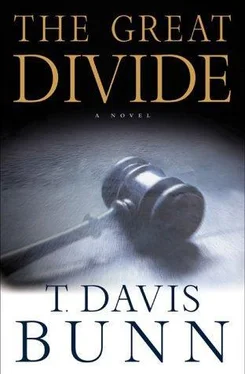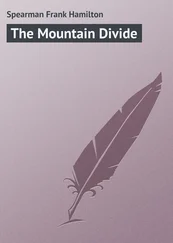T. Bunn - The Great Divide
Здесь есть возможность читать онлайн «T. Bunn - The Great Divide» весь текст электронной книги совершенно бесплатно (целиком полную версию без сокращений). В некоторых случаях можно слушать аудио, скачать через торрент в формате fb2 и присутствует краткое содержание. Жанр: Триллер, на английском языке. Описание произведения, (предисловие) а так же отзывы посетителей доступны на портале библиотеки ЛибКат.
- Название:The Great Divide
- Автор:
- Жанр:
- Год:неизвестен
- ISBN:нет данных
- Рейтинг книги:5 / 5. Голосов: 1
-
Избранное:Добавить в избранное
- Отзывы:
-
Ваша оценка:
- 100
- 1
- 2
- 3
- 4
- 5
The Great Divide: краткое содержание, описание и аннотация
Предлагаем к чтению аннотацию, описание, краткое содержание или предисловие (зависит от того, что написал сам автор книги «The Great Divide»). Если вы не нашли необходимую информацию о книге — напишите в комментариях, мы постараемся отыскать её.
The Great Divide — читать онлайн бесплатно полную книгу (весь текст) целиком
Ниже представлен текст книги, разбитый по страницам. Система сохранения места последней прочитанной страницы, позволяет с удобством читать онлайн бесплатно книгу «The Great Divide», без необходимости каждый раз заново искать на чём Вы остановились. Поставьте закладку, и сможете в любой момент перейти на страницу, на которой закончили чтение.
Интервал:
Закладка:
He walked back to the Blazer, climbed in, started the motor, and sat there a long moment staring down the steep drop to the little clapboard church. He wondered why they had bothered to send the cheerleader down at all. Marcus put the vehicle into gear and pulled from the space.
He stopped at the intersection, then drove past the construction site. The road became clogged with muddy tracks and the rumble of diesel thunder.
That was when they struck.
Marcus caught a glimpse of light against metal and turned in time to see a pickup hurtle down the graveled rise. He watched in disbelief as the mud-splattered truck hit an unseen slope and bounced all four wheels off the dirt.
Marcus almost left it too late. Then the roar of the pickup’s engine spurred him to stomp on the accelerator. Which meant the pickup slammed into his rear fender, and not his door.
The impact flung him across the seat, the wheel slewing under his grip. Before he could recover, he was hammered back the other way. The second truck’s aim was higher, mashing in his passenger door and showering him with broken glass.
The driver of the second truck opened his door and leaned on the running board. He wore a sweat-stained cap and a two-day growth. He shouted above the roar, “Your kind ain’t welcome here!”
Marcus glanced behind and to his left. The other driver was opening his door and reaching behind him for something hanging in his rifle rack-maybe a bat, maybe a gun.
The man yelled through his side window, “We got ways to take out the likes of you!”
Marcus jammed himself upright and stomped on the accelerator. The Blazer jumped the curb and sent mud and loose gravel spewing out behind. The attacker got off one good whack, splintering Marcus’ rear window. Marcus fought for control as the rise steepened, then slid back over the curb and roared away. He took the final corner overtight and struck the brick entrance logo a glancing blow.
Marcus hurtled onto the state road and raced through the wooded section, finally bursting into the green fields bordering the old church. He was shaking so hard he had difficulty lifting his foot from the accelerator and unclenching his grip on the wheel. He searched the road behind him, saw nothing. He turned back in time to read the sign welcoming him to Rocky Mount, home of the new South.
FIVE
As usual, the nightmare came calling in the raven-black hour before dawn. As ever, Marcus rose in weary defeat and started his day several hours before his body was ready.
The year before the accident, one of the firm’s senior partners had been diagnosed with terminal cancer. Marcus had taken over the partner’s most critical case, one he was destined to lose. Marcus had spent a lot of time with the senior partner-at first because Marcus needed guidance, later because the man needed some tenuous connection with the life he was leaving behind. Over and over Marcus heard the partner refer to his illness as simply, the cancer. Marcus had not taken much note of it then, assuming that the guy was saying it so briefly and succinctly because of Marcus’ own sensibilities. Now he knew better. It was all Marcus could do to refer to his own compilation of tragedies as, the accident. To give it any more space, either in thoughts or in words, would have broken him entirely. The same was true of his new nemesis, the nightmare. There was no way to use more words and still contain all the horror and all the pain. The nightmare came every night. It had been thus since the accident. It awoke him just before dawn. It robbed him of his most precious hour of sleep. It drove a spike through the heart of every new day.
Marcus packed his bag, then ate his breakfast standing at the kitchen counter. He took the Beltline around Raleigh to the airport, the night-dark road tense and packed with early techie commuters.
The earliest Raleigh flight bound for National was a prop job operated by United Express. Marcus joined the other boarders, observed their grim faces and stone-hard eyes, and wondered what other demons journeyed with them that day.
Marcus emerged from National Airport in time to watch dawn streak the Washington sky with a hundred different shades, all of them palest blue. He took a taxi into the city, accompanied by fragments of unwelcome memories. He had not been to Washington in eighteen months. He had not left North Carolina in all that time. Before, Marcus had traveled almost constantly. He had come to Washington at least twice a month-sometimes on business, other times to visit Carol’s parents.
Like Marcus, his former wife was an only child. He had once joked that this was the single part of their background they held in common. Carol’s family was old Delaware money. Very old. One of her direct ancestors had received a land grant from King George III. The deed, with its watered ribbons and royal seals, still hung upon the living-room wall of their Wilmington estate. They also had a summer home outside Annapolis, which had been in the family since Carol’s great-grandfather served two terms as a United States senator. The kids had loved this sprawling clapboard manor, the only reason Marcus had ever endured weekends with Carol’s parents. They also owned a penthouse on Central Park West and an apartment in a Louis XIV manor on the rue Faubourg St-Honoré-neither of which he had ever been invited to visit. He had never been to Europe at all. It was one of those things he had always promised Carol and never managed to deliver. One of many.
Marcus sat in the window of a Starbucks in Foggy Bottom, pretending to read the Washington Post . Behind him, the six employees called a constant cadence and beat rapid tattoos on the coffee machine. Beyond his window streamed a hectic Friday crowd, most of them young and intelligent-looking and focused on the day ahead. Marcus sipped his coffee and found hints of his own past reflected in those intent young faces.
In the early days of their marriage, he had refused the offer of a job from Carol’s father for a thousand reasons. The biggest had been that he was too hungry. He had wanted a place where he could scramble and push and fight and make it on his own terms. He had considered the firm of Knowles, Barbour and Bradshaw to be a perfect fit, and for several years it truly was. The firm had been cobbled together from numerous local groups, all merged under the umbrella of what had once been a San Francisco-based firm. Now it was everywhere-offices in thirty-two states and eleven foreign countries. Marcus had thrived on the sixteen-hour days, the ninety-hour weeks, the competition, the breakneck pace, the constant demand to bill more hours. Carol came from a long line of workaholics, and had learned early on not to complain.
He wasn’t exactly sure when the marriage had started to unravel. It would be too easy to say, his final year of law school, on the day they had met. But there was some truth in that statement. Enough to propel him from his seat and out the door and down Constitution Avenue.
At precisely nine o’clock he signed in at the State Department’s main entrance on C Street. Five minutes later he was approached by a balding man in his late forties with a bureaucrat’s poker face. “Mr. Glenwood?”
“Yes.”
“James Caldwell. As you were told yesterday on the phone, there’s nothing anyone can do for you here.”
Marcus accepted that the man was not even going to invite him to sit down. “It seems to me that an American citizen gone missing-”
“We don’t have the resources.” The man wore an ill-fitting checked suit of bluish gray and a goatee with more hair than was on the top of his head. “We deal strictly with policy matters.”
“-who’s gone missing in China would be a vital enough issue to concern our government.”
Читать дальшеИнтервал:
Закладка:
Похожие книги на «The Great Divide»
Представляем Вашему вниманию похожие книги на «The Great Divide» списком для выбора. Мы отобрали схожую по названию и смыслу литературу в надежде предоставить читателям больше вариантов отыскать новые, интересные, ещё непрочитанные произведения.
Обсуждение, отзывы о книге «The Great Divide» и просто собственные мнения читателей. Оставьте ваши комментарии, напишите, что Вы думаете о произведении, его смысле или главных героях. Укажите что конкретно понравилось, а что нет, и почему Вы так считаете.












